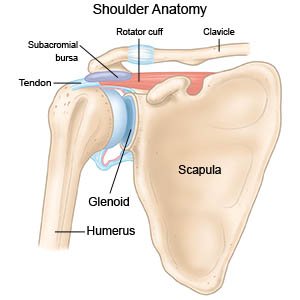Rotator Cuff Injury
Medically reviewed by Drugs.com. Last updated on Apr 6, 2025.
What is a rotator cuff injury?
A rotator cuff injury is damage to the muscles or tendons of your rotator cuff. The rotator cuff is a group of muscles and tendons that hold the shoulder joint in place. The damage may include muscle stretching, tendon tears, or bursa inflammation. The bursa is a fluid sac around the joint.
 |
What are the signs and symptoms of a rotator cuff injury?
- Pain that may be constant or come and go (such as only when you lie on the injured shoulder)
- Pain or stiffness in your shoulder that travels down your arm
- Trouble lifting your arm or placing it behind your back
- Trouble moving or using your shoulder
- A swollen shoulder that may be painful to the touch
- Numbness in part or all of your arm
- A popping noise along with pain when you lift your arm
How is a rotator cuff injury diagnosed?
Your healthcare provider will ask if you have had an injury or surgery on your shoulder. He or she will examine your shoulder, and test the strength and movement of your arm. You may need other tests to show what is causing your symptoms:
- Ultrasound pictures may show fluid or swelling around your rotator cuff.
- X-ray, CT scan, or MRI pictures may show an injury or other problems causing your symptoms. You may be given contrast liquid to help your shoulder show up better in the pictures. Tell the healthcare provider if you have ever had an allergic reaction to contrast liquid. Do not enter the MRI room with any metal. Metal can cause serious injury. Tell the healthcare provider if you have any metal in or on your body.
How is a rotator cuff injury treated?
- Medicines may be needed for pain or inflammation.
- A physical therapist can teach you exercises to help improve shoulder movement and strength, and decrease pain. You may learn changes to daily activities that will help decrease stress on your tendons.
- Surgery may be needed if your injury is severe or your symptoms do not improve. Surgery may be used to clean away damaged tissue or fix a tear. A piece of another tissue or muscle may be used to fix a badly torn tendon. The bone of your shoulder joint may be reshaped so it stays in place. An artificial joint made of metal and plastic may be put into your shoulder.
Treatment options
The following list of medications are related to or used in the treatment of this condition.
How can I care for my rotator cuff injury at home?
- Rest your shoulder as directed. Overuse of your shoulder can make your injury worse. Avoid heavy lifting, putting your arms over your head, or sports that need an overhead or throwing motion. Any of these movements can cause or worsen a rotator cuff injury.
- Put ice on your shoulder for 15 minutes every hour, or as directed. Ice helps decrease pain and swelling. Use an ice pack, or put crushed ice in a plastic bag. Wrap a towel around the bag before you put it on your shoulder.
- Put heat on your shoulder when directed. After the first several days, heat may help relax the muscles in your shoulder. Use a heat pack or heating pad. Apply heat for 20 minutes every hour, or as directed.
When should I call my doctor or orthopedist?
- You suddenly cannot move your arm.
- The pain in your shoulder or arm is not improving, or is worse than before you started treatment.
- You have new pain in your neck.
- You have questions or concerns about your condition or care.
Care Agreement
You have the right to help plan your care. Learn about your health condition and how it may be treated. Discuss treatment options with your healthcare providers to decide what care you want to receive. You always have the right to refuse treatment. The above information is an educational aid only. It is not intended as medical advice for individual conditions or treatments. Talk to your doctor, nurse or pharmacist before following any medical regimen to see if it is safe and effective for you.© Copyright Merative 2025 Information is for End User's use only and may not be sold, redistributed or otherwise used for commercial purposes.
Learn more about Rotator Cuff Injury
Treatment options
Care guides
- Abrasion
- Calcific Tendinitis
- Laceration
- Muscle Strain
- Rotator Cuff Tendinitis
- Shoulder Bursitis
- Shoulder Dislocation
Symptoms and treatments
Further information
Always consult your healthcare provider to ensure the information displayed on this page applies to your personal circumstances.
